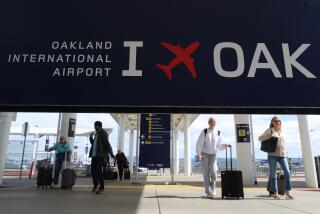Airport Authority Should Now Court Compromise
- Share via
Despite the city of Burbank’s clear legal victory in yet another skirmish in its war with the airport that bears its name, no one should celebrate too loudly--except perhaps the lawyers as they cash their paychecks. Los Angeles County Superior Court Judge Carl J. West’s opinion last month that Burbank has some say over expansion of the Burbank-Glendale-Pasadena Airport was a welcome development in a fight that has dragged on too long at too great a cost. Yet, even as the judge established Burbank’s authority in deciding how big a new terminal should be, the warring sides show no indication that they are willing to sit down and hammer out their differences once and for all.
Not even the most insistent critics of the airport’s expansion plan believe West’s ruling will go unchallenged. That’s too bad. Lawyers for the autonomous authority that runs the airport on behalf of Burbank, Glendale and Pasadena argued that Burbank’s claim of land-use sovereignty was nothing more than a roundabout way to control noise at the airfield. Burbank lost a landmark 1973 case before the U.S. Supreme Court, which concluded that federal laws superseded the city’s efforts to reduce noise. That has been the Airport Authority’s position all along: that Burbank should either get on board with expansion plans or get out of the way.
The Times has long supported reasonable expansion of Burbank Airport--somewhere between the current facility’s 14 gates and the authority’s proposal of up to 27 gates. Sitting too close to the runway, the existing terminal is not as safe as it could be. Nor is it anywhere near the size necessary to handle the existing traffic load. Aisles are packed during peak times, and passengers waiting to depart often sit on the floor for lack of seats. Both the Airport Authority and Burbank agree that a new terminal is something that would be beneficial to both the airlines that use the airport and the city as a whole.
But Burbank wants noise levels capped and demands a curfew banning late-night and early-morning traffic. The authority insists it cannot deliver on those promises. And it is correct. The Federal Aviation Administration regulates air traffic and it has been reluctant in the past to impose restrictions like those demanded by Burbank. Such restrictions are not impossible, but they require the FAA to act as more than an airline lap dog. Last month, U.S. Rep. Howard Berman (D-Panorama City) and Sen. Barbara Boxer (D-California) called on new FAA administrator Jane Garvey to discuss ways to minimize noise impact on neighborhoods surrounding the airport. That’s a smart step. Would airlines like a curfew at Burbank? Certainly not. Would they dislike it enough to abandon the lucrative commuter market the airport serves? Not likely.
Only when all parties legitimately want a solution can one be found through compromise. Managers of the airport and politicians from Burbank’s partner cities paint the city as unreasonably standing in the way of change. But, as West’s ruling makes clear, Burbank has the right and responsibility to protect the interests of its residents. More than any other city in the alliance, Burbank will suffer the negative effects of a bigger airport. It deserves a strong voice. How would city council members from Glendale or Pasadena feel if the roles were reversed?
Over time, we have urged both sides to acquiesce at key points in the debate. Sometimes Burbank acts like a spoiled child, such as when it walked out of mediation talks earlier this year. Sometimes airport officials act like arrogant parents, such as when they offer to apply for a curfew in one breath and promise it will fail in the next. This time, we call on the Airport Authority and the cities of Glendale and Pasadena to reconsider Burbank’s compromise proposals and work with the city and the FAA to solve the most problematic element of expansion--noise. Victory can be handed down by the courts or it can be reached collectively at the bargaining table.
It’s time to talk.
More to Read
Sign up for Essential California
The most important California stories and recommendations in your inbox every morning.
You may occasionally receive promotional content from the Los Angeles Times.










